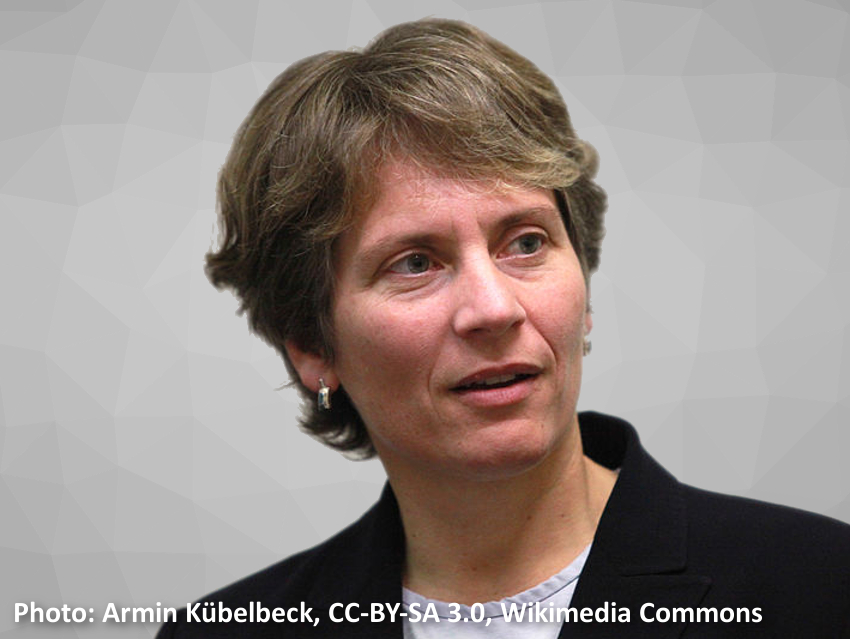Carolyn Bertozzi, Stanford University, CA, USA, has been awarded the 2020 Chemistry for the Future Solvay Prize. Bertozzi was honored for her invention of bioorthogonal chemical reactions that can be performed in living cells and organisms. These reactions can be used to label specific molecules in cells for imaging, drug target identification, and biotherapeutics development.
The prize comes with EUR 300,000 and is awarded every two years. It recognizes a scientist for major discoveries that lay the foundation for the chemistry of the future while serving human progress. The award ceremony was held at the Palais des Académies in Brussels, Belgium, on March 10, 2020.
Carolyn Bertozzi studied chemistry at Harvard University, Cambridge, MA, USA, and at the University of California (UC) Berkeley, USA, where she received her Ph.D. in 1993. After postdoctoral work at UC San Francisco, USA, in the field of cellular immunology, she joined the faculty of UC Berkeley in 1996. In 2015, Bertozzi joined Stanford University. Today, she serves as Anne T. and Robert M. Bass Professor of Chemistry and Professor of Chemical & Systems Biology and Radiology there, as well as an Investigator at the Howard Hughes Medical Institute.
Among many other honors, Carolyn Bertozzi has received the Ernst Schering Prize from the Schering Foundation in 2007, the Lemelson-MIT Prize from the Lemelson Foundation and the Massachusetts Institute of Technology (MIT) in 2010, the Heinrich Wieland Prize from the Boehringer Ingelheim Foundation in 2012, and the Arthur C. Cope Award from the American Chemical Society (ACS) in 2017. She is a Fellow of the U.S. National Academy of Inventors and of the American Association for the Advancement of Science (AAAS), as well as a Member of the U.S. National Academy of Sciences, the American Academy of Arts and Sciences, and the German Academy of Sciences Leopoldina. Among other commitments, Bertozzi served on the international advisory board of Angewandte Chemie in 2010–2015.
Selected Publications
- Engineering Orthogonal Polypeptide GalNAc-Transferase and UDP-Sugar Pairs,
Junwon Choi, Lauren J. S. Wagner, Suzanne B. P. E. Timmermans, Stacy A. Malaker, Benjamin Schumann, Melissa A. Gray, Marjoke F. Debets, Megumi Takashima, Jase Gehring, Carolyn R. Bertozzi,
J. Am. Chem. Soc. 2019, 141, 13442–13453.
https://doi.org/10.1021/jacs.9b04695 - Acute Modulation of Mycobacterial Cell Envelope Biogenesis by Front-Line Tuberculosis Drugs,
Frances P. Rodriguez-Rivera, Xiaoxue Zhou, Julie A. Theriot, Carolyn R. Bertozzi,
Angew. Chem. Int. Ed. 2018, 57, 5267–5272.
https://doi.org/10.1002/anie.201712020 - Multiple Click-Selective tRNA Synthetases Expand Mammalian Cell-Specific Proteomics,
Andrew C. Yang, Haley du Bois, Niclas Olsson, David Gate, Benoit Lehallier, Daniela Berdnik, Kyle D. Brewer, Carolyn R. Bertozzi, Joshua E. Elias, Tony Wyss-Coray,
J. Am. Chem. Soc. 2018, 140, 7046–7051.
https://doi.org/10.1021/jacs.8b03074 - Cu-free click cycloaddition reactions in chemical biology,
John C. Jewett, Carolyn R. Bertozzi,
Chem. Soc. Rev. 2010, 39, 1272–1279.
https://doi.org/10.1039/b901970g - Bioorthogonal Chemistry: Fishing for Selectivity in a Sea of Functionality,
Ellen M. Sletten, Carolyn R. Bertozzi,
Angew. Chem. Int. Ed. 2009, 48, 6974–6998.
https://doi.org/10.1002/anie.200900942 - Copper-free click chemistry for dynamic in vivo imaging,
J. M. Baskin, J. A. Prescher, S. T. Laughlin, N. J. Agard, P. V. Chang, I. A. Miller, A. Lo, J. A. Codelli, C. R. Bertozzi,
Pro. Natl. Acad. Sci. USA 2007, 104, 16793–16797.
https://doi.org/10.1073/pnas.0707090104
Also of Interest
- Heinrich Wieland Prize 2012 for C. Bertozzi,
ChemViews Mag. 2012.
Carolyn R. Bertozzi, USA, awarded for her bioorthogonal method for changing cellular sugar codes and detecting diseased cells - C. Bertozzi Awarded 2011 Emanuel Merck Lectureship,
ChemViews Mag. 2011.
Carolyn Bertozzi, University of California, Berkeley, USA, has been awarded the Emanuel Merck Lectureship - Invention and Innovation Award,
ChemViews Mag. 2010.
Wiley-VCH author and Angew. Chem. Advisory Board member, Carolyn Bertozzi will receive this year’s $500,000 Lemelson-MIT Prize




